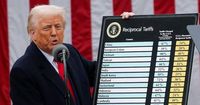Gold prices fell on Friday, April 4, 2025, as investors reassessed risk prospects related to U.S. President Donald Trump's tax policies. Meanwhile, Asian stock markets struggled to recover from significant losses in the previous trading session.
On this day, spot gold decreased by 0.5%, settling at $3,097.99 per ounce, although it is on track for its fifth consecutive weekly increase. Gold futures in the U.S. dropped by 0.1% to $3,118.90. Earlier in the week, gold prices had seen a significant decline of over 2% due to a sell-off, following a record high of $3,167.57 per ounce.
Ilya Spivak, the global macroeconomic director at Tastylive, commented, "Gold tends to increase in price during uncertain times, a trend disrupted as markets learn to price associated risks." The recent tax policy announced by Trump, which includes a basic 10% tax on all imports into the U.S., has raised concerns among major trade partners and investors alike, leading to fears of escalating trade wars and rising consumer prices in the world's largest market.
In addition to gold, the prices of other precious metals also saw declines. Spot silver fell by 1% to $31.56 per ounce, platinum decreased by 0.6% to $946.40, and palladium dropped by 0.8% to $920.75.
In the oil market, Brent crude oil futures decreased by 31 cents, or 0.4%, to $69.83 per barrel, while U.S. West Texas Intermediate crude oil futures fell by 32 cents, or 0.5%, to $66.63 per barrel. The oil prices continued to decline during early trading in Asia, marking what could be their worst week in several months due to the new tariffs imposed by the U.S. administration, which have raised concerns about potential impacts on global oil demand.
Asian stock markets experienced a sluggish day on Friday. Japan's Nikkei index fell by 1.85%, extending a 2.8% drop from Thursday, April 3, 2025. The broadest MSCI index of Asia-Pacific stocks outside Japan decreased by 0.26%, with trading volumes remaining low as the Chinese markets (including Hong Kong and Taiwan) were closed for a holiday.
In a stark reflection of market volatility, S&P 500 companies lost a staggering $2,400 billion in market value overnight, marking the largest single-day loss since the onset of the COVID-19 pandemic.
Other Wall Street indices experienced similar fluctuations. U.S. stock futures showed mixed signals at the beginning of Asian trading, with Nasdaq futures rising by 0.05% while S&P 500 futures decreased by 0.06%. The significant sell-off across markets followed Trump's announcement of the most substantial trade barriers Washington has seen in over a century on Wednesday, prompting investors to seek safer assets.
David Bahnsen, Chief Investment Officer at The Bahnsen Group, stated, "If current tax levels are maintained, an economic recession is likely in Q2 or Q3, leading to a market downturn. The question is whether the U.S. President will seek to backtrack on this policy as the stock market declines. I am confident that Trump is refocusing on the number of companies investing significantly in the U.S., but that may not reverse market sentiment."
In the foreign exchange market, the U.S. dollar rose by 0.09% against the yen to 146.23, following a 2.2% drop in the previous session, which was the largest daily decline in over two years. The euro remained stable at $1.1043 after a 1.9% increase on Thursday, while the Swiss franc stood at 0.8591 per USD after a 2.6% rise on the same day. Against several other currencies, the U.S. dollar fell to a six-month low of 102.04.
Jane Foley, a senior foreign exchange strategist at Rabobank, remarked, "Much of the dollar's weakness this year relates to the volume of buy positions built at the end of the year, coupled with a focus on U.S. growth risks amid tariff negotiations over several weeks."
In a related development, the wealth of the world's billionaires experienced significant fluctuations on March 3, 2025, according to Forbes' "Winners and Losers" ranking. Carlos Slim Helu, the Mexican telecommunications billionaire, saw the largest increase in assets, gaining $2.3 billion. Lei Jun, founder of Xiaomi, saw his assets increase by $1.1 billion, while co-founder Lin Bin gained $395 million. Meanwhile, Chris Ruddy, founder of Newsmax, increased his assets by $377 million, and Prince Alwaleed Bin Talal Alsaud gained $248 million.
However, the day was not kind to several tech billionaires. Mark Zuckerberg, CEO of Meta (Facebook), faced a staggering loss of $17.9 billion, which was likely driven by fluctuations in Meta's stock price following negative news regarding financial results and legal issues surrounding the company. Jeff Bezos, founder of Amazon, also saw a significant loss of $16 billion, while Larry Ellison, co-founder of Oracle, lost $9.9 billion, and Michael Dell, CEO of Dell Technologies, recorded a loss of $9.4 billion. Elon Musk, often at the top of the wealth rankings, lost $8.7 billion due to a continued decline in Tesla's stock price amid competitive pressures and disappointing sales.
These sharp fluctuations in wealth highlight the extreme sensitivity and risk inherent in today's financial markets. The reality that a single trading session can result in billions of dollars vanishing or materializing is increasingly common, especially as global markets continue to grapple with inflation, geopolitical tensions, consumer trends, and rapid technological advancements.





